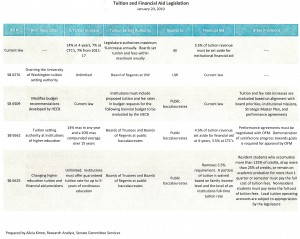This morning the Senate Operations & Elections Committee held a public hearing on Senate Bill 6362.
Senate Bill 6362 relates to government accountability. In an effort to learn more, I attended the hearing. Evergreen did not weigh in on the bill.
Senate Bill 6362 builds on an evolving effort to improve state government accountability and transparency. In the mid-nineties the Joint Legislative Audit and Review Committee (JLARC) was created to make state government operations more effective, efficient, and accountable. JLARC employs the State Auditor and conducts performance audits, program evaluations, sunset reviews, and other analyses to meet its objectives.
In 2005, the Legislature passed legislation that created the Citizen Advisory Board to improve efficiency, effectiveness, and accountability in state government. The Board works in sync with the State Auditor.
In the fall of 2005, Washingtonians passed Performance Audits of Government Act (PAGA) which increased the role of the State Auditor by allowing this office to conduct independent, comprehensive performance audits of state and local governments.
Senate Bill 6362 would focus the State Auditor’s work on verifying the efficiency of the top ten government priorities identifiedy by the Legislature. As a result, in addition to audits of programs and activities by agency, SB 6362 would permit audits of identified priorities.
So what are these priorities? They are:
1. Student achievement in K-12
2. Quality and respect for public workforce
3. Value of state college or university education
4. Health of state citizens
5. Security of the state’s vulnerable children and adults
6. The economic vitality of business and individuals
7. Statewide mobility of people, goods, information, and energy
8. Safety of people and property
9. Quality of the state’s natural resources
10. Cultural and recreational opportunities throughout the state.
Each year, under SB 6362, JLARC would select one of the ten priorities and determine the relative priority of all programs and actitivies within that category. Those priorities identified as the highest would be subject to a performance audit by the State Auditor to determine that the programs and activities are operating at maximum efficiency. Those priorites determined to be the lowest would have a less demanding assessment.
The tasks identified under SB 6362 would be funded through a 30% allotment of funds assessed against the Performance Audits of Government Account.
The only group to testify during the public hearing for SB 6362 came from Washington newspapers in support of the bill.


